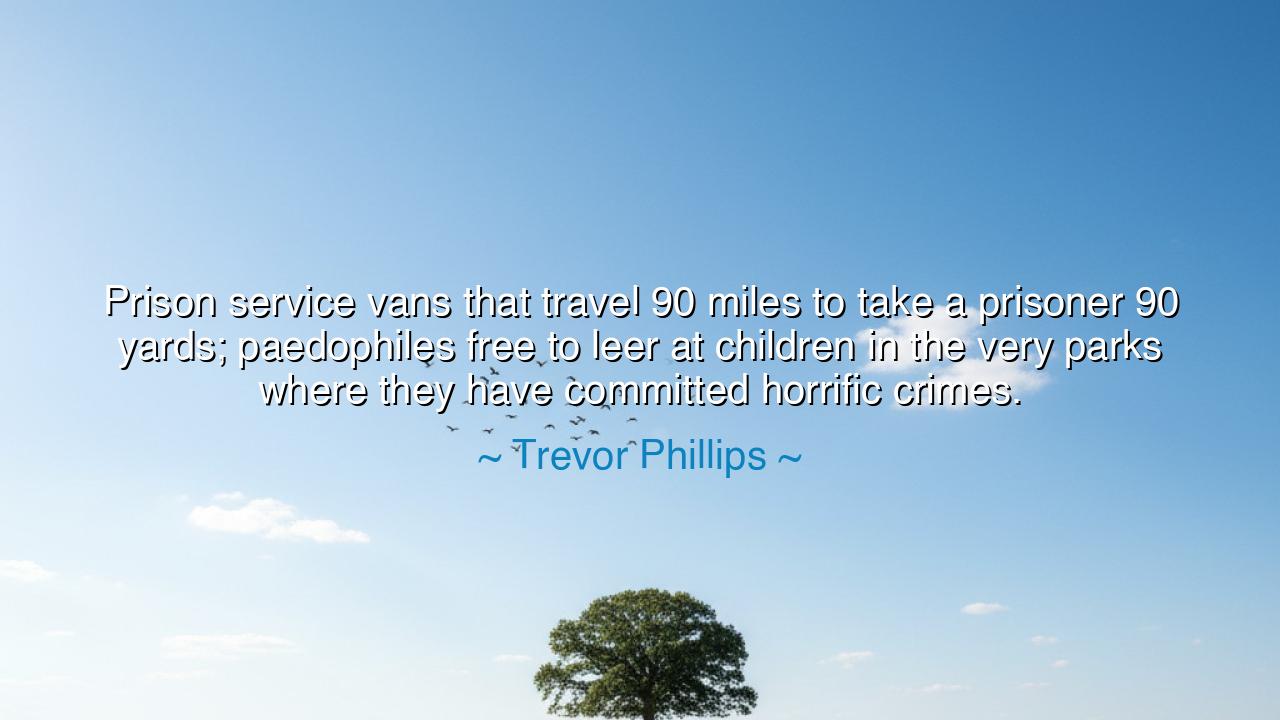
Prison service vans that travel 90 miles to take a prisoner 90
Prison service vans that travel 90 miles to take a prisoner 90 yards; paedophiles free to leer at children in the very parks where they have committed horrific crimes.






Trevor Phillips, with the sharpness of one who observes the flaws of society, once declared: “Prison service vans that travel 90 miles to take a prisoner 90 yards; paedophiles free to leer at children in the very parks where they have committed horrific crimes.” These words are not spoken lightly, but as an indictment of a system that fails in both justice and reason. In his lament, we hear both the frustration at bureaucratic absurdity and the outrage at moral negligence. He reveals the tragedy of a society where resources are squandered on inefficiency, yet true dangers to the innocent are left unchecked.
The origin of this saying lies in Phillips’ role as a social critic and public servant in Britain, where he frequently spoke out against injustices, hypocrisies, and contradictions in the structures of governance. His words capture two wounds at once: the wastefulness of bureaucracy and the failure of justice to protect the vulnerable. A van that travels ninety miles to cover ninety yards is not only inefficient—it is a symbol of a system that has lost sight of common sense. A predator free to haunt the very grounds of his crimes is not only unjust—it is a sign that society has forsaken its duty to safeguard the weak.
These words ring with the same timeless anger that prophets of old voiced against corrupted cities and faltering kingdoms. For what is the purpose of law, if not to defend the innocent and punish the guilty? And what is the role of governance, if not to order resources toward the greater good? Yet here we are shown a world inverted: justice wasted on technicalities, mercy misplaced upon the unrepentant, vigilance drowned in procedure. In such a world, true peace cannot endure, for the people lose faith in the guardians who are meant to watch over them.
History shows us the peril of such neglect. Consider the fall of Rome, where endless bureaucracy and corruption weakened the empire from within. Grain was hoarded while the poor starved, soldiers were sent to useless marches while barbarians advanced. The empire crumbled not only from foreign attack, but from the inefficiency and blindness of its leaders. In the same way, Phillips warns that when systems lose sight of justice and reason, collapse is not far behind. Waste erodes strength, and injustice erodes trust—together, they rot the foundation of society.
Yet his words also remind us of the sacred responsibility of power. To defend the vulnerable, especially children, is among the highest duties of civilization. A nation that allows predators to walk freely while lavishing resources on absurdities betrays its moral compass. This is not merely inefficiency; it is injustice—and injustice is poison to the soul of any people. For as long as the guilty roam unpunished and the innocent remain unprotected, peace will be an illusion, and society will tremble beneath the weight of its contradictions.
The lesson is stern but necessary: justice must be guided by wisdom and moral clarity, not only by rules and procedures. Efficiency without justice is meaningless, and justice without wisdom is blind. We must demand of our leaders that they place resources where they defend life, not waste them on vanity or error. And we must demand that the law not only bind itself to procedure, but also to the higher duty of protecting the most vulnerable among us.
Practically, this means vigilance in both governance and citizenship. Citizens must hold institutions accountable, asking: does this serve the common good, or is it a waste? Does this protect the innocent, or does it neglect them? Leaders must cut through bureaucracy with courage, refusing to allow absurd inefficiency to consume the very energy that should defend the people. And all must remember: a society is judged not by how it treats the powerful, but by how it protects its weakest members.
Thus, Trevor Phillips’ words endure as a cry of warning and a call to action: “Prison service vans that travel 90 miles to take a prisoner 90 yards; paedophiles free to leer at children in the very parks where they have committed horrific crimes.” Let them remind us that absurdity and injustice, if left unchallenged, will eat away at the soul of civilization. But if we confront them with wisdom, courage, and vigilance, we may yet build a society where justice is swift, resources are wisely used, and the innocent dwell in safety.






AAdministratorAdministrator
Welcome, honored guests. Please leave a comment, we will respond soon